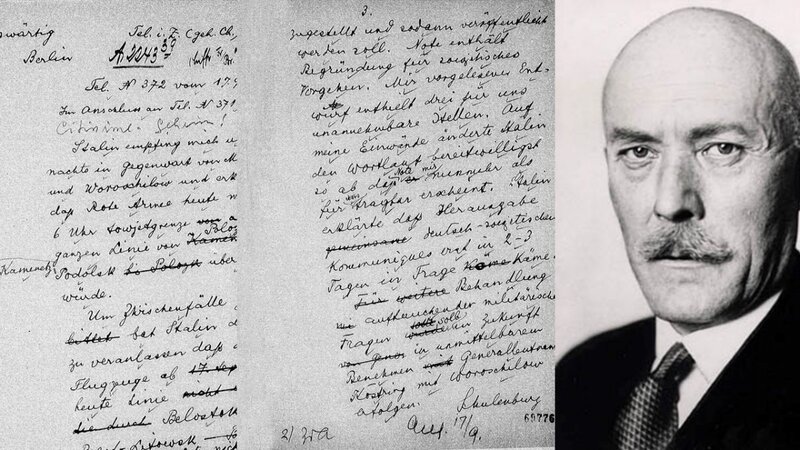Following the Molotov-Ribbentrop Pact, Germany and the USSR collaborated in their aggressive policy against Poland, albeit the Soviets, destracted by the conflict with Japan, did not match the German move right away and delayed military action. In mid-September 1939, however, with the Japanese problem out of the way, Stalin could invade the Polish territory and attack the army, already fighting against overwhelming Wehrmacht forces. To that effect, in the early hours of 17 September, the Soviet leader summoned Ambassador von Schulenburg to Kremlin. What transpired during that meeting was accurately reported by the German diplomat in a cable he sent his superiors in Berlin a few hours later:
No. 372 of September 17
Reference: cable no. 371 of September 16.
Stalin received me at 2 a.m. in the presence of Molotov and Voroshilov, and declared that the Red Army would cross the Soviet border at 6 o'clock this morning along the whole line from Polotsk to Kamianets-Podilskyi.
In order to avoid incidents, Stalin requested that we urgently ensure that as of today, German planes do not venture east of the Bialystok-Brest-Litovsk-Lemberg line.
Beginning today, the Soviet planes will bomb the area east of Lemberg. I promised to do my best with regard to informing the German Air Force, but since so little time was left, I requested that Soviet planes be ordered not to come too close to the aforementioned line today.
The Soviet delegation will arrive in Bialystok tomorrow, or the day after at the latest.
Stalin read me a note that is to be handed to the Polish Ambassador tonight, and during the day copied, sent to all diplomatic missions, and then published. The note contains a justification for the Soviet action. The draft I was read included three issues which were unacceptable to us; following my objections, Stalin obligingly altered the text to the point that the note now seems satisfactory. Stalin stated that we could not consider issuing a joint German-Soviet statement earlier than in two or three days.
In the future, all military matters that come up are to be consulted by Lieutenant-General Köstring directly with Voroshilov.
Schulenburg
What followed was over 600,000-strong invasion force attacking the Polish Army from behind, which helped the German offensive and speeded up Polish defeat. As a result, Poland was partitioned again by its totalitarian neighbours, and the annexation of its territory was accompanied by repressions against its population.
